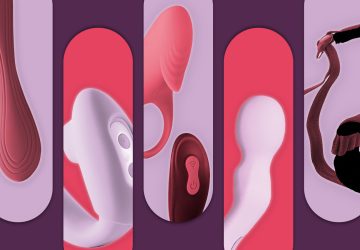Find Pleasure Over Pain With Endometriosis
March marks Endometriosis Awareness Month, yet there is still so much women don’t know about it. Endometriosis occurs when the tissue that normally lives in the uterus grows outside of the uterus. This tissue can be found on the ovaries or fallopian tubes. Endometriosis affects around 10% of women aged 25 to 40 and affects about 200 million women worldwide, yet the cause remains unknown.
Symptoms
Persistent or recurring pain during sex, referred to as dyspareunia, is one of the most common symptoms of endometriosis. Other symptoms include heavy menstrual bleeding and painful periods. The type of pain can vary from person to person, including the location, duration, and the types of movements or sexual positions that lead to pain during or after sex.
A recent study found that women with endometriosis experienced emotional and relational distress due to their sexual pain. Sexual pain also had an impact on sexual desire, with 88% of women who reported having interrupted sex. 59% of women reported avoiding sex because of their pain.
Solutions
Anyone experiencing unwanted pain during sex should talk to their partners and doctors. Sex doesn’t have to be a painful experience, and there are ways to reduce pain during sex. According to the International Society for Sexual Medicine, here are a few ways to thrive with endometriosis:
Know that you have options – You do not have to cope or deal with your sexual pain alone. Unfortunately, only about half of women discuss their pain with partners and providers.
Communicate – Talk to your partners and doctors. When seeking medical treatment, find a provider who makes you feel comfortable. During your appointment, describe your pain, including when it starts, how long it lasts, the location, and how it feels (i.e., stinging, burning, stabbing). Talk to your provider about all your options, which can include hormonal and surgical options.
Understand your body – Acknowledge and communicate the type of sexual experiences that bring pleasure. This can include non-penetrative activities like kissing, touching, oral sex, etc. You can also try various positions, especially if pain is experienced with deep penetration. Using a lubricant is also a helpful tool. You might want to consider a CBD lube that is long-lasting and reduces discomfort.
Try alternative coping strategies – Some women may choose to seek options that do not involve surgery or hormones. These other options might include relaxation, mindfulness, sex therapy, counseling, or support groups.
Remember, sexual communication is important and vital for a healthy sex life. Endometriosis does not have to prevent you from having a satisfying sex life; it may just involve some adjustments.
Top Sex Toy by State: Number One May Surprise You
Ways to Celebrate Women’s History Month
Ashley Townes
PhD, MPH, Sexual Health ResearcherDr. Townes has experience working as a Community Health Educator and Disease Intervention Specialist in Cincinnati and the surrounding areas. She has worked on several initiatives related to the dissemination of national HIV prevention and care campaign materials tailored for African Americans, Hispanic/Latinx, and transgender women of color. Dr. Townes has taught collegiate-level Human Sexuality courses, served as an Epidemiologist at the Ohio Department of Health, and currently works as a sexual health researcher in Atlanta, GA.
Ashley’s research background includes work on the sexual experiences of African American/Black women accessing health information and utilizing sexual health services. In 2018, she received grant funding from the Patty Brisben Foundation for Women’s Sexual Health to translate sexual health research data into educational materials. Her career interests are aimed at providing quality sexual education and working towards health equity.









